Quote
Certainly McCartney lacked Lennon’s knack for separating his personal and professional lives. Lennon was proclaiming that he had finally rediscovered himself. ‘I got lost in the Beatles, and now it’s John Lennon again… So whatever I’m doing as Beatles, Yoko’s sitting on my shoulder like a parrot.” But McCartney believed in himself as a Beatle, first and foremost, and an equal partner with Lennon, and he understandably felt each assault from his colleague as a thrust to the heart. Gill Pritchard, one of the so called Apple Scruffs, remembered the night when ‘Paul came racing out of the front door of the recording studio in tears, went home and didn’t come back’.
Peter Doggett (You Never Give Me Your Money)
#i'm still working my way thru doggett#partley bc he comes up with stuff like this#that is just kind of bizarrely off base and i'm like ...#when u bring ur gf to work literally every day#that is a total LACK of separation#that john seems emotionally disinvested in the b's#while paul is still entirely invested#would be more accurate#(w the caveat that john's disinterest seems less genuine than strategic much of the time)
150 notes
·
View notes
Quote
[Paul] told his companions excitedly that he was a boy when he knew me.
“We met when Royston came to Liverpool and stayed at the Gambier Terrace flat. We spent the night together.”
I told him I didn’t remember that.
He grinned and explained that we spent the night talking our heads off. He said that he and the boys were fascinated because I was a beat poet from London. He said that he remembered a line from one of my poems: “Grease me in easy, grease me in easy” he quoted.
I told him that actual words were “Break me in easy.”
He said that his version sounded right and I told him I was surprised he remembered.
He explained to his friends that I was very important to them then.
“The things you told us. You remember telling John, George, Stuart and myself that one in four people were gay? We looked at each other and wondered which one it was.”
I commented that at that age and that year none of us knew much about anything. I recalled travelling with him and John in a van and Paul asked me about the slang being used in London. And I explained to them then about benzedrene nose inhalers.“
"Yes!” said Paul, almost nostalgically. “You turned us on.”
Poet Royston Ellis remembering a conversation with Paul McCartney, 40 years after they first met in 1960 (via swaying-daisies)
137 notes
·
View notes
Quote
I discovered Mark Lewisohn...so I created a monster, I think.
Philip Norman, interviewed on Something About the Beatles, Episode 54
30 notes
·
View notes
Quote
India is the big turning point in the Beatles for me. And it's never really been looked at properly and does need to be. Because the group that came back from India was not the same one that went there...I don't know all the answers to that, but I'm looking.
Mark Lewisohn, Something About the Beatles, Episode 9 (2014) I was listening to this earlier today, and it reminded me of something Michael Gerber said in this thread (http://www.heydullblog.com/yoko-ono/my-yoko-problem-and-yours/): "The third volume will reveal the brief [Mark Lewisohn]'s been working under all these years. Is all this just embroidery, or will he go where the evidence points, no matter what?"
128 notes
·
View notes
Quote
The baby-faced 15-year-old whom John was to meet on this innocent summer’s afternoon - the more-than-collaborator, more-than-partner, more-than-brother destined to share his life and live in his mind and voice for almost the whole of the next decade - would always seem like his polar opposite in every possible way. Yet in their origins and family backgrounds they were remarkably similar
John Lennon: The Life, Philip Norman (via mclennon60)
258 notes
·
View notes
Video
youtube
John Lennon on Monday Night Football 1974
I’m sorry, did John just say hearing Yesterday cheered him up no end? LMFAO
62 notes
·
View notes
Photo
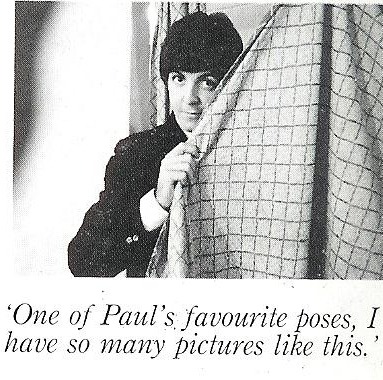
Opera House, Blackpool, 26 July 1964.
Photo and caption by Dezo Hoffmann.
575 notes
·
View notes
Text
Well, according to Ron Wood's autobiography, John was still using heroin as late as 1977. I would honestly bet that, with enough accurate information about John's usage, someone could put a chart together tracking the near perfect alignment of John's periods of antagonism towards Paul and his relapses into heroin.
#unfortunately tarot readers aren't therapists#and occult experts aren't drug addiction specialists#and john never came close to getting the help he needed#bc it suited someone to have him unhealthy
37 notes
·
View notes
Video
youtube
Tony Hazzard - “Paul McCartney” (1973)
Ummm. I LOVE this. Written at a time when Paul was really getting dumped on, I hope he heard and enjoyed this track.
38 notes
·
View notes
Photo

2K notes
·
View notes
Audio
December, 1968: John (alongside Yoko) talks to Maurice Hindle about the travails of communication and human connection. [Note: I previously quoted a bit from this interview here in regards to John’s longing for sharing in each other’s minds telepathy and typical #projecting onto George. A more complete transcript of this excerpt will be edited into the post as soon as I feel better or at least less ill. My sincere apologies!]
HINDLE: What do you think about language?
JOHN: I think it’s a bit crummy, you know? It is a drag form of communication, really. We’ll get – we’ll get telepathy. I believe that.
HINDLE: You believe that?
JOHN: Yeah, sure. Sure. Sure as anything I believe. It’s too… Because now we need it so much. Just for me to communicate with that guy and he’s written a letter to a paper to tell me to tell me and I’m talking to a tape to you that he might never see. Where’s that, you know? But if he was really wanting to communicate with me, even to come and see me to talk is hard. What I’m saying to you, you’re translating it all the time even though it’s English into what you think I’m saying. And I’m only saying what I’m trying to say from way back there which is coming out in the limited amount of vocabulary I have anyway, and the way I’m trying to describe all that or all this, you know? It’s nowhere.
…
HINDLE: Yeah, but unless you’re going to be a dropout, you’ve got to compromise haven’t you?
HINDLE: Well, you have to a bit, but it’s not a great sin. You’re compromising by not fucking every woman you fancy as you walk down the street. You’re compromising by not smashing everything you don’t like when you feel like smashing it. The compromise is within yourself, you know. We’re all good and bad. You’ve got to compromise one thing or the other to just take a step forward. You’ve got to compromise whether you’re going to fall over when you walk up a set of stairs or anything, really. It’s the degree of com– of how much you compromise.
HINDLE: It’s what your value is… when you compromise.
JOHN: Yeah, yeah. You know.
HINDLE: What one person values as compromise, another doesn’t.
JOHN: Yeah and the point is that – a lot of us probably all agree – we all really know the compromise we’re talking about, it’s that one where you sell out. And everybody thinks everybody else has sold out. But there’s even guys just in business that don’t think they’ve compromised and they haven’t really, and they’re secretly trying to do what everybody else is trying to do but they don’t know it half the time or they don’t realise. ’Cause even just, I was talking to that guy Lord Beeching, I said, “We want help with this Apple, but we don’t want any of them, you know, this that and the other… We’re idealists.” And I was giving it to him, you know, “That’s what we’re trying to do and we want a happy office,” and all that. And he rightly sort of said, “Listen man, there’s a few idealists; they’re aren’t all – they’re not complete set of fascists, there’s one or two human beings in the city.” Which I hadn’t allowed for, with my great open minded awareness and all that. I just hadn’t allowed for any human beings in the banks or anywhere. But there are some human beings there, there’s probably some in the government, you know? I still sort of find it hard to believe, but somewhere in that pile of slush there might be some human beings. But it’s hard… it’s that bit, you know. There are – there’s people everywhere of the same mind and it’s just… even amongst ourselves we can’t communicate. Which is the hard bit, you know.
HINDLE: Yeah.
JOHN: Amongst the people that sort of really agree.
HINDLE: Just ’cause of words?
JOHN: Just ’cause of words, and upbringing, and attitude, and how you express your… Well, it’s just some – you’ve got to find a mutual sort of language to express yourself, you know? And my language is that—
HINDLE: Unless you fall in love it’s impossible to communicate like that.
JOHN: I mean, I wasn’t in love last year, but I was communicating quite well with people. Not as well, or maybe not as powerfully. ’Cause now there’s two of us, doing that, brrmmm, whatever it is. Sending out a vibration or whatever. But before it was me and… or me and George, alright, or whatever it was; we weren’t in love, but. You know. There’s enough in you to shove it out. It is just that bit. If you – if somebody comes in a room and he’s uptight and that, he can make the whole room uptight.
93 notes
·
View notes
Video
1988 Paul McCartney & George Martin -Today Show discussing John Lennon Book
So I think this clip really helps puts the “John’s not gay” party line in perspective.
First of all, it’s obviously vile how being allegedly “homosexual” is characterized as an “accusation.” (And I say that without personally blaming David Frost, George Martin or Paul) The 80’s were so incredibly homophobic, and anyone who doesn’t believe or understand that definitely needs to watch this entire video. John’s sexuality is something Yoko and Paul (and apparently George Martin) had to go on media and publicly defend. There were MUCH WORSE allegations in The Lives of John Lennon, but the one that was treated as most heinous was the possibility that John might’ve liked guys.
I think that this full clip, in context, also shows that Paul (seemingly extemporaneously or with only mild preparation) does a pretty good job of
saying “Fuck off, Goldman”
reminding people not to necessarily believe everything they read in trash bios (!!!) and
urging the audience (most of which he KNOWS is homophobic as hell) to be forgiving of John’s flaws and mindful of his struggles, no matter what comes out
Paul’s addition of, “if he was homosexual, why didn’t he make a pass at me?” in this context sounds simply like he was throwing his body between John and the proverbial bullet. Out of context (and because Paul has since repeated this line over the years), it sounds as if Paul is implying that if John was “gay” (i.e. bisexual, which we now know he was) he’d be interested in Paul (which many people believe he was). But it looks to me -and I may be totally wrong- that the initial line was simply said to defend/protect John. In other words: “If you want to assail John’s sexuality, you’re gonna have to come through me first.”
#yeah everyone needs to be mindful that the 'accusations' first surfaced during a time period#where the president's spokesman would literally make AIDS jokes#'throwing his body between john and the proverbial bullet'#is such a succinct way of putting it#absolutely it was a way of defending john
84 notes
·
View notes
Photo
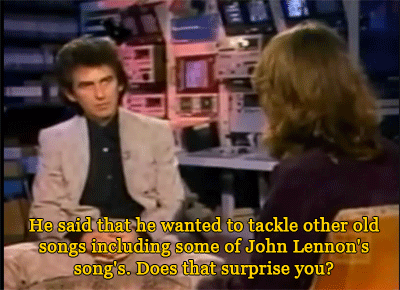
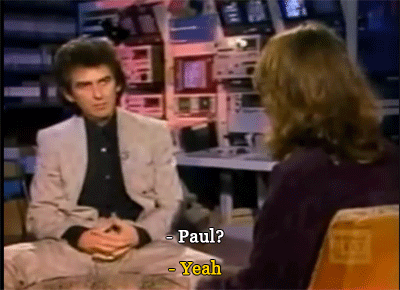
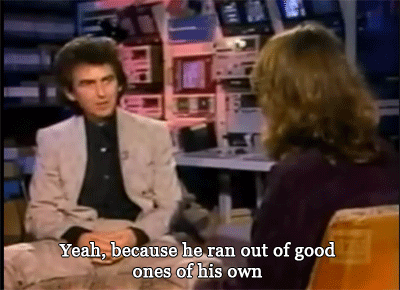
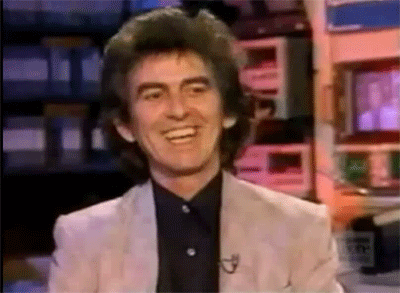
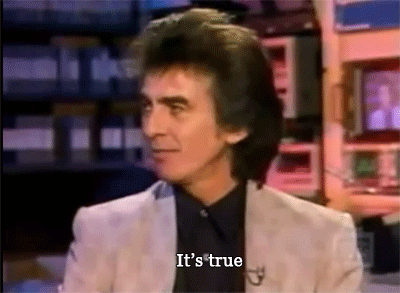
George Harrison. The sassy Beatle.
#man a guy gets a hit and starts talking shit#did george start doing james ray songs bc he ran out of good ones of his own??#hmmmm 🤔#(the least appealing aspect of his personality is that he can't let an opportunity for a dig pass without taking it ugh)
10K notes
·
View notes
Quote
Because I'm not the easiest guy to read, although I'm fairly naive and open in some ways, and I can be conned easily. But in other ways I'm quite complicated, and it's not easy to get through all the defenses and see what I'm like. Klein knew me quite well, without even meeting me. Also he knew to come to me and not to go to Paul, whereas somebody like Lew Grade or Eastman would have gone to Paul. So he knew that to get in he'd have to come through me.
John Lennon, Peter McCabe and Robert Schonfeld interview, September 5, 1971 Oh, my poor little naive man-child, holy cripes. Klein didn't go through Paul because Paul was wise to creeps like him! And Klein's type of 'don't you remember writing 70% of I Am The Walrus, Paul?' and 'I'll get Linda a million dollar movie contract' garbage would've had Paul throwing him out on his ass -- bc Paul is hip to that jive. And actually, by going through John and antagonizing Paul from the beginning -- by making no genuine effort to win Paul over and moreover by denigrating Paul's role as part of his initial approach to John -- Klein was ensuring that he would NOT 'get in' with the Beatles via John. So his whole method was fucked! All Klein was getting 'in' to was J, G and R's solo work, while destroying the Beatles (and the possibility of managing any of Paul's sure-to-be lucrative solo projects, if they continued on as a looser collaboration). These are not the moves of a smart businessman (or a worthwhile person, yadayadayada).
#yeah he knew you#he had you as a fucking mark John!!#brian & paul sure must have warded off a lot of sharks#bc john was so perpetually ripe for exploitation#he had such a naive streak#(to his credit he half recognizes it but not enough to think it thru)
56 notes
·
View notes
Audio
September, 1986 (MPL Communications, London): A candid and emotionally tangential Paul talks about Yoko’s recent capricious contrivances and wonders what he could have done that apparently hurt John so manifestly.
PAUL: I mean, I went at Yoko’s request to New York recently. I went to New York. She said she wanted to see me, and I said I was going through New York and stuff, so I stopped off and rang her, and she said she couldn’t see me that day. I was in New York, I was like four hundred yards away from her. And I said, “Well, I mean, I’ll pop over any time today – five minutes, ten minutes, whenever you can squeeze me in.” She said, “It’s going to be very difficult.” I said, “Well, okay, I understand. What is the reason, by the way?” She said, “I was up all night with Sean.” I said, “Well, I understand. I’ve got four kids, you know, I understand how terrible it is, but you’re bound to have a minute today, sometime.” I said, “I’m leaving soon. Can’t really hang around.” And she asked me to come. Flown in, specially.
SALEWICZ: Wait, you’d gone there specially to see her?
PAUL: Yeah. Yeah, to see her. And she wouldn’t even see me. So I’m kind of a little bit humiliated, but I said, “Okay, nine-thirty tomorrow morning, then, let’s make an appointment.” And she rang up at about nine o’clock and said, “Could you make it tomorrow morning?”
SALEWICZ: But I mean, completely off the record, she’s still suffering, isn’t she? She’s still on methadone, isn’t she? [inaudible]
PAUL: I don’t know. I really don’t know. I honestly don’t know, mate, I honestly don’t know. Um, so that’s the kind of thing. What I’m saying is, it wasn’t all my fault. I’m beginning to let myself off a lot of the guilt.
SALEWICZ: Do you have a lot of guilt, did you take—?
PAUL: Yeah. Yeah. Well, when the world’s greatest entertainer calls you Engelbert Humperdinck, you get feelings of… something. And yeah, I always felt guilty. Always felt guilty. But looking back on it, I keep thinking, okay, let’s try and analyse this. Now John was hurt; what was he hurt by? What was the single biggest thing that we can find in all our research that hurt John? And the biggest thing that I can find is that I told the world that the Beatles were finished. And I don’t think that’s so hurtful. I know he said it was like publicity for my album, but I don’t even think that’s hurtful. Big deal. Four months after—
SALEWICZ: Traditionally, people do do these things a bit [inaudible] anyway, and you might as well—
PAUL: But four months after the group’s broken up, and we’ve waited for four months to see if it would get back together again, I then announced – I’ll tell you what was unfortunate, the method of announcing it all, which again there’s a story behind that. Which was that I said to the guy at the office – which had to be Peter Brown, of book fame. I said, “I’ve got an album coming out, McCartney. And I don’t really want to see too much press. Can you do me some question-and-answer things?” I answered them all, and had them printed up and put in the press copies of the album. But I think the perception of that, when it arrived on the journalists’ desks, was, “Oh, this is McCartney really [doing a number].” I look at it now and really kind of shudder. At the time it was me trying to answer some questions that were being asked and I decided to not fudge that question. [Note: Where John’s hurt is concerned, Paul may or may not be referring specifically to his answering “Do you foresee a time when Lennon-McCartney becomes an active songwriting partnership again?” with a definitive “No.”]
And I say, looking back on it, I don’t think… I mean, if that’s the most hurtful thing I did, I haven’t really heard much else beyond that. We didn’t accept Yoko totally, but like I say, how many groups do you know, these days—? I mean, it’s a joke. It’s like Spinal Tap! I mean, it’s Spinal Tap. A joke!
SALEWICZ: Of course. Actually as I was saying, I always thought, I always have this assumption when I go interview groups, say you interview everyone, you think everyone knows what’s going on, but you talk to individual members and you find no one knows what’s going on. They don’t communicate at all. And then you start seeing it on stage, you know, like you suddenly see how separate they are onstage. What, The Clash is the… [inaudible]
PAUL: Daltrey and Townsend. Daltrey and Townsend on Live Aid. And Pete started copying Roger’s movements, because he knew exactly what Roger was going to do, and so in the end Roger started doing Pete’s movements. They pissed each other off something terrible, actually.
But anyway, generally speaking, you know, what I’m saying is, I loved John. I was his best mate for a long time. Then, the group started to break up. It was very sad. I got the kind of rap as being the guy who broke the group up. But that’s not actually true.
#he's had to deal with this person who treats him with total contempt for 50 years#imagine having to run a business with her#imagine having to run a business with someone who genuinely believes in the sort of superstitious crap she's into
147 notes
·
View notes
Quote
Q: And he was gonna write with Paul?
Douglas: He was looking to get hooked up with Paul” yeah. But yeah, that call came through and that didn’t happen. And Paul went off and got in trouble. And when he got in trouble …
Q: He didn’t get the message from anyone?
Douglas: No.
Q: Who kept him away?
Douglas: I think Yoko probably thought … I can’t speak for Yoko. Maybe she thought it’d be a distraction. I don’t think it would have been…Who knows what would have happened. But when Paul got busted for pot in Japan, we were in the studio, when that call came in that he was in trouble, man, you oughta see John flippin’ out.
Interview with Jack Douglas (via bewaremylove)
#see i think jack has the...feelings right...#but i don't get his dates here#since paul was arrested in january and the df sessions started in aug#so was john freaking out about some other paul crisis...?#bc jack has said he hadn't seen john for a year or something before he was called in to do df#(he and j and sean met by chance in a grocery store in like 79 after not having seen each other since before the LW)#idk idk#(i hope he goes on fabcast like they said he might tho!!)#(his insinuation that elliot mintz and presumably yoko had someone break into his house to steal his photos of john is one of the spookiest#uh accusations in all of beatle-verse btw)#(also from my pov totally believable)
148 notes
·
View notes
Quote
[John] was very much putting himself in the position where he was cut off from anyone that could pose a threat to the dynamic between him and Yoko, and I think nobody greater than Paul.
Robert Rodriguez, Something About the Beatles Episode 44 (referring to John's isolation from 75-80) (He means 'nobody was a greater threat to the dynamic between Yoko and John than Paul was' -- it's clear in context but not as clear transcribed)
#basically it's like...#beatle authors: paul was essentially both the first wife and the incredibly tempting other woman in john's 2nd marriage#beatle authors: only by putting an ocean in between them could yoko (and uncle sam) keep them apart#also beatle authors: no homo#(tho i will say rodriguez does not do the 'no homo' bit -- he lets his cohost do it for him)
62 notes
·
View notes